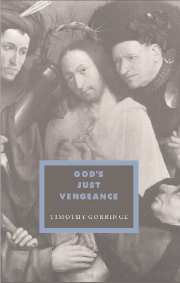Book contents
- Frontmatter
- Contents
- General editors' preface
- Acknowledgements
- List of abbreviations
- 1 Religion and retribution
- PART I THE CULTURAL FORMATION OF ATONEMENT: BIBLICAL SOURCES
- PART II MAKING SATISFACTION: ATONEMENT AND PENALTY 1090–1890
- PART III CONTEMPORARY DIRECTIONS IN ATONEMENT AND PENAL THEORY
- 9 The gospel and retribution
- 10 Forgiveness, crime and community
- Select bibliography
- Index
- CAMBRIDGE STUDIES IN IDEOLOGY AND RELIGION
10 - Forgiveness, crime and community
Published online by Cambridge University Press: 25 January 2010
- Frontmatter
- Contents
- General editors' preface
- Acknowledgements
- List of abbreviations
- 1 Religion and retribution
- PART I THE CULTURAL FORMATION OF ATONEMENT: BIBLICAL SOURCES
- PART II MAKING SATISFACTION: ATONEMENT AND PENALTY 1090–1890
- PART III CONTEMPORARY DIRECTIONS IN ATONEMENT AND PENAL THEORY
- 9 The gospel and retribution
- 10 Forgiveness, crime and community
- Select bibliography
- Index
- CAMBRIDGE STUDIES IN IDEOLOGY AND RELIGION
Summary
All Christian services and all Christian teaching in prison strike one with a sense of futility because the whole atmosphere of the prison life is a denial of Christianity. The forgiveness and love of God etc. are meaningless terms to a man who has never known forgiveness and love from men and is in prison because men refused to give them to him.
Hobhouse and Brockway, English Prisons TodayChristian atonement theology is the attempt to spell out how Christ is supposed to have helped us. It envisions the possibility of recreating a broken world, of redeeming what would otherwise be lost. In Western society since at least the seventeenth century the offender has been the paradigm case of such potential loss, but the possibility of redemption in this life has for much of that time hardly been in view. On the contrary, various forms of punishment or retribution have been a surrogate for eternal punishment. The motto guiding punishment has been the motto Dante set over the gates of hell: ‘Abandon hope.’ Over the past thousand years offenders have been hanged, put in the pillory, transported, whipped, put in solitary confinement, set on the treadwheel, and sent to Borstal. None of this has reduced crime. As we have seen, there are those who conclude that, with regard to offenders, ‘nothing works’.
- Type
- Chapter
- Information
- God's Just VengeanceCrime, Violence and the Rhetoric of Salvation, pp. 248 - 271Publisher: Cambridge University PressPrint publication year: 1996



